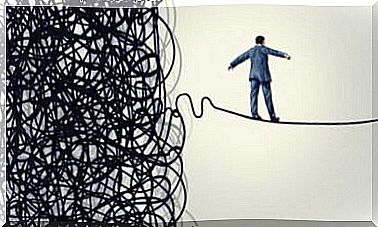Is It True That 95% Of Our Daily Thoughts Are Garbage?

We have all read or heard it before: 95% of our daily thoughts are garbage. Is this true? If this statement were true, it would be little more than a shock to our self-esteem. What’s more, what use would so many years of evolution have served us? If the result of all that sophisticated phylogeny has resulted in a brain that only produces useless cognitions, then Homo sapiens would have failed as a species.
Therefore – and to improve our dignity a bit – we must clarify that not everything that passes through our mind is waste material. In reality, the human being has a factory of ideas and thoughts that always works at maximum performance. We are relentlessly thinking entities and in fact, according to science, we have about 6,200 thoughts a day.
Not everything that our busy brain produces is adverse or harmful. Not useless either. The truth is that if there is something we do frequently, it is remembering, rambling and imagining.
We are not forced to reason like Leonardo Da Vinci would in order to breathe easy and tell ourselves that all the thoughts we produce are innovative and powerful. It is enough to shape a mental universe that mediates in our well-being and not in unhappiness or anguish.

95% of our daily thoughts are garbage: truth or a lie?
The fact that we are told that 95% of our daily thoughts are garbage puts us on alert, there is no doubt. Taking for granted that everything we think about for most of our time is useless would leave us in a very bad place. However, we comply with our working hours, we connect with others, we draw plans, we dream, we make decisions …
Of course, there are times when certain thought patterns fuel the fire of anxiety. There are also people who, due to their personal experiences, have a type of mental focus in which past trauma and suffering are thrown back. In these cases, rather than producing useless thoughts, what is done is shaping adverse cognitive flows.
On the other hand, there is an aspect of great interest in this regard. An investigation carried out by the Department of Psychology, Queen’s University (Kingston) indicates that few things are more complicated than knowing what happens in our “black box” of cognition. Each person is unique and the style of thinking is directly related to our personality.
Thus, people who show neuroticism as a trait will show a more worried and hypersensitive thinking pattern. However, not everything has to be waste material. Let us therefore see what type of cognitive processes are the most common in our mental universe.
Eternal nostalgic, we spend the day remembering things
Why do we suddenly remember certain situations without knowing why? It is very difficult for the brain to relate some things to others, to link stimuli from the present with experiences from the past.
Sometimes nostalgia invades us, it is true, but the truth is that if there is something we do frequently, it is to evoke things from the recent or distant past. The point is that remembering also has its usefulness: it allows us to make better decisions in the present.
Flow state: the operational state of mind
If we were to take for granted the idea that 95% of our daily thoughts are garbage, we should assume that we are clearly unproductive people. However, we spend many hours performing tasks and functions.
It was the psychologist Mihály Csíkszentmihályi who defined a mental process in which we occupy part of our time. We refer to the so-called flow state, those situations in which the brain is focused on an activity that concentrates all its attention.
For example, when we work, read a book or indulge in our favorite hobby, the mind is involved in the present moment, where all its interest, creativity and effort are poured.
The Butterfly Mind: Wandering and Daydreaming
Wandering, daydreaming, letting our mind drift from one idea to another, from one image to another … Losing ourselves in the contemplative universes of introspection also has its benefits.
After all, focusing attention on something 24 hours a day is completely impossible for the brain (it consumes too much energy). So processes like imagining and fantasizing also have their benefits. With them, we reduce stress, connect with ourselves and allow the brain to rest and the mind to encourage creativity.

95% of our daily thoughts are junk: the problem of self-talk
The claim that 95% of our daily thoughts are junk may have a basis of truth, but only in certain cases. There is something that we must be clear about. The patterns of thought depend on the personality of each one, his personal history and the circumstances that surround him.
In certain cases, internal dialogue can act as a crusher of well-being: annihilating spirits, devouring hope and extinguishing self-esteem. Indeed, there are times when we are our worst enemies and in those cases, thoughts rather than being “garbage” are “radioactive material.”
Therefore, and to conclude. Not everything that the human mind makes and designs is pernicious; not in all cases and not 24/7.
What we think is often related to how we feel and, indeed, there are times when life is more complicated than necessary. The positive of these cases is that we can and must change that mental and emotional flow so that it mediates our well-being.









